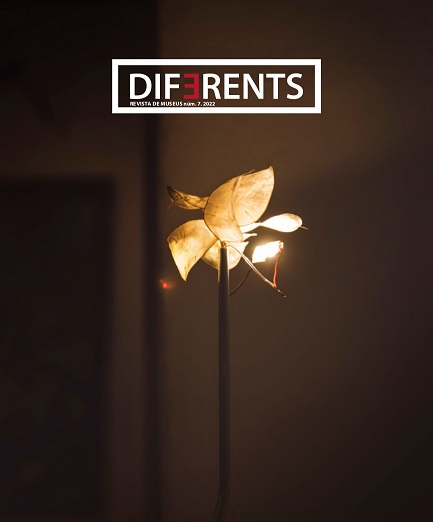The Museum as a Cultural Catalyst: A Review from the Perspective of Social Museology, Non-Formal Education and Communication
Main Article Content
Abstract
This text proposes a review of the social perspective of museums, based on the results obtained in my doctoral research, completed in 2019, which formulated a cultural management methodology based on citizen participation to connect with the environment. Following the different lines of action that emerged in the thesis, the present paper proposes an exploration of the current situation of museums as transformative spaces responsible for socio-cultural action in a given context. The experiences analysed make it clear that both education and new communication technologies will play a fundamental role in the conception of a more social museum. In turn, the type of institution that is proposed will have to favour the involvement of citizens and, therefore, collaborate in the development of the environment in which it is located. Museum institutions would thus become, as is already happening in several cases, cultural catalysts, that is, key spaces for the socio-cultural growth of a specific context.
Downloads
Article Details
References
ALEMANY SÁNCHEZ-BOSCOSO, Vicente., SARDÁ SÁNCHEZ, Raquel. (2020). El arte del simulacro. Tecnología y nuevos modelos expositivos en la cultura del ocio y el entretenimiento. En, Bueno Doral, T. González Hernando, I., Navajas Seco, R. (coords.) Cultura y tecnologías digitales socialmente responsables e innovadoras. Gijon: Trea
ALONSO FERNÁNDEZ, Luis. (2012). Nueva Museología. Madrid: Alianza Forma.
AYALA AIZPURU, Iñigo, CUENCA AMIGO, Jaime. & CUENCA-AMIGO, Macarena. C. (2021). La transformación de los museos en los últimos años. Principales cambios percibidos por los visitantes. Arte, individuo y sociedad, 33(3), 935-956. https://dx.doi.org/10.5209/aris.70437ARTÍCULOS
BAZ SÁNCHEZ, Sara Gabriela., & SÁNCHEZ MICHEL, Valeria. (2020). Museos y educación: encuentros y desencuentros (reflexiones para su investigación). Nierika 18 - año 9 - julio-diciembre 2020 - pp. 186-204
Autor (2019).
CASTRO VALDEZ, Paulo Cesar. (2018). Catalizador artístico para el fortalecimiento de la cohesión social. Collique, distrito de Comas,Trabajo de Investigación. Universidad César Vallejo 2018. https://repositorio.ucv.edu.pe/handle/20.500.12692/29379
CHICAIZA, Tatiana, & CHONTASI, David. (2021). Turismo Comunitario y Mu-seo: Articulación para el Fortalecimiento de bases locales. Ecuadorian ScienceJournal.5(1), 37-45.DOI: https://doi.org/10.46480/esj.5.1.97
CLAES, Florencia.,DELTELL, Luis.(2019). Museo social en España: redes sociales y webs de los museos estatales .El profesional de la información, v. 28, n. 3, e280304. https://doi.org/10.3145/epi.2019.may.04
DELGADO PACHECO, Ssissy. (2020). Los retos en investigación, comunicación y educación de los museos de Lima en el marco de la COVID-19. Una discusión sobre los desafíos del futuro a partir de su situación actual y de las experiencias del MALI y el MUCEN. Desde el Sur, 12(1), 285-306. https://dx.doi.org/10.21142/des-1201-2020-0017
GÓMEZ MARTÍNEZ, Javier, (2006). Dos museologías. Las tradiciones anglosajona y mediterránea. Gijón, Ediciones Trea.
GONZÁLEZ, Ricardo. (2019). El giro educativo del arte como herramienta para la transformación social en los nuevos museos del siglo. Grupo de Investigación CAPIRE Departamento de Historia del Arte I Universidad Complutense de Madrid XXI. ISSN: 2254-8718 http://hdl.handle.net/10902/18521
IGLESIAS, Jose Manuel (2020). Museos españoles en Facebook: análisis de su comunicación en el marco del museo social digital. ESIC Editorial.
LEÓN, Aurora (2010). El Museo: teoría, praxis y utopía. Madrid: Cátedra.
LÓPEZ, Jose María, CÁCERES, Miriam Jose M., & GIMÉNEZ, Jesús, (2020). Buenas prácticas en educación patrimonial: análisis de las conexiones entre emociones, territorio y ciudadanía. Aula abierta, 49(1), 45-54.
LORENTE, J.P (2012). Manual de historia de la museología. Gijón: Trea.
NAVAJAS CORRAL,O. GONZÁLEZ FRAILE, J. (2018) La aplicación de la Museología Social en España: desafíos para su implementación en el sureste de la Comunidad de Madrid, e-cadernos CES [Online], 30 | 2018, publicado a 15 dezembro 2018, consultado a 28 julho 2021. URL: http://journals.openedition.org/eces/3722; DOI: https://doi.org/10.4000/eces.3722
MARCIAL, N., & BESSONE, C. (2020). Comunicación y patrimonio cultural. Comunicación patrimonial en instituciones museísticas de Río Gallegos. Informes Científicos Técnicos-UNPA, 12(2), javascript:void(0)84-101.
MOHEDANO, Félix O., GARCÍA MARTÍN, Inma G., & PELÁEZ, María Esther. (2020). Comunicación y Educación en los Museos, espacios de interacción en la Zona de Desarrollo Próximo en España. Education in the knowledge society (EKS), (21), 13.
MÖRSCH, Carmen. (ed.),(2010) Documenta 12 education 2: Between Critical Practice and Visitor Service. Diaphanes. Berlin and Zürich, pp.9-31
PADILLA-LLANO, Samuel Esteban., MACHADO-PENSO, María V., REYES-SCHADE, Emilio, LARIOS-GIRALDO, Paola M., CABRERA-SÁNCHEZ, Irina., MARTÍNEZ-PALACIOS, Emerson., GONZÁLEZ-FORERO, Daniel, & TAPIAS-MARTÍNEZ, Juan. (2020). Barrio el Prado a Living Museum for the City of Barranquilla. On the W@terfront, 62(3), 3–46. https://doi.org/10.1344/waterfront2020.62.6.3
PEÑALOZA. Gonzalo, QUIJANO, Lina, FALLA, Sigrid., MÁRQUEZ, Sara. (2018). Acercar las fronteras entre el museo y la escuela como escenarios educomunicativos, En, Nómadas, núm. 49, 2018, Julio-Diciembre, pp. 173-187, Universidad Central, DOI: https://doi.org/10.30578/nomadas.n49a10
PINO APABLAZA, Fernando. (2021). Transformación digital y museos sin fronteras. Una evaluación de siete museos de la ciudad de Lima en tiempos de pandemia. Revista De Investigaciones De La Universidad Le Cordon Bleu, 8(1), 104-119. https://doi.org/10.36955/RIULCB.2021v8n1.010
RÁBAGO, Laura Eugenia. (2019). El museo de Antioquia y sus buenas prácticas en la transformación sociocultural. Trabajo de Investigación. Universidad de Guanajuato, http://repositorio.ugto.mx/bitstream/20.500.12059/1691/1/184795.pdf
RIUS, Joaquim. (2008). Los barrios artísticos: Base local de la cultura global. Análisis del caso del Raval de Barcelona. Revista Internacional de Sociologia, 2008, vol. LXVI, num. 51, p. 179-205. http://hdl.handle.net/2445/68390
ROGOFF, Iritt. (2008). Turning. E-flux journal, 1, E1-E10
SABATÉ NAVARRO, Miquel., GORT RIERA, Roser. (2012). Museo y comunidad. Un museo para todos los públicos. Gijón. Ediciones Trea
STOFFEL, Mercedes. (2012) De que hablamos cuando hablamos de Sociomuseología. En: Revista de Museología (RdM), Nº 53, pp. 8-14.
VALDÉS SAGÜÉS, Mª del Carmen (1999). La difusión cultural en el museo: servicios destinados al gran público. Gijón, Ediciones Trea.


